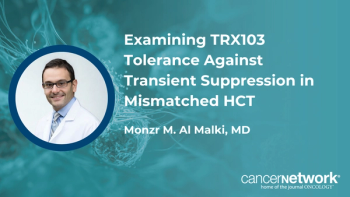
For Survival, Acalabrutinib Bests Standard of Care in Relapsed or Refractory CLL
After 3 years of follow-up in the ASCEND study, progression-free survival continues to favor acalabrutinib vs investigator’s choice of therapy for relapsed chronic lymphocytic leukemia.
According to 3-year follow-up data from the phase 3 ASCEND study (NCT02970318) that were presented at the
Long-term follow-up findings from the ASCEND study, which were presented by Wojciech Jurczak, MD, PhD, head of the department of hematology at Maria Skłodowska – Curie National Research Institute of Oncology in Kraków, Poland, also demonstrated that acalabrutinib was well tolerated with no new safety findings.
“Overall, these data support the use of acalabrutinib patients with relapsed refractory chronic lymphocytic leukemia including those with high-risk features,” Jurczak said during the presentation.
Jurczak explained that “acalabrutinib is the next-generation, highly selective covalent BTK inhibitor approved for treatment of chronic lymphocytic leukemia.”
In the randomized-controlled, multicenter, open-label, phase 3 ASCEND study, 310 patients (median age, 67 years) with relapsed/refractory chronic lymphocytic leukemia were assigned either 100 mg of oral acalabrutinib (n = 155) or the investigator’s choice of standard of care:
- 150 mg of oral idelalisib (Zydelig) twice per day with rituximab (Rituxan; 375 mg/m2 for the first infusion then 500 mg/m2 intravenously for a total of 8 infusions) (n = 119) or
- 70 mg/m2 of bendamustine intravenously plus rituximab (375 mg/m2 for the first infusion then 500 mg/m2 intravenously for a total of 6 infusions) (n = 36).
“We may say that that is the first and perhaps the only randomized comparison of BTK inhibitor and IP3K inhibitor in relapsed refractory chronic lymphocytic leukemia,” Jurczak said during the presentation.
Jurczak also referenced the primary findings of the ASCEND study.
“In the primary analysis of the ASCEND, study, acalabrutinib demonstrated superior progression-free survival and a favorable safety profile compared to investigators’ choice,” he explained. “Primary analysis was done at the median follow up of 16 months. Here, we present the data at 3 years.”
Both groups received treatment until unacceptable toxicity or disease progression. Patients were able to crossover to the acalabrutinib monotherapy group if they progressed on either of the investigator-selected treatments. Researchers assessed overall survival, progression-free survival, safety and overall response rate during a median follow-up of 36 months for the acalabrutinib group (range, 0.5-44) and 35.2 months for those treated with idelalisib/rituximab or bendamustine/rituximab (range, 0.03-42.5).
During follow-up, patients treated with acalabrutinib monotherapy had significantly prolonged progression-free survival compared with those treated with idelalisib/rituximab or bendamustine/rituximab (median, not reached [NR] vs. 16.8 months; HR = 0.29; 95% CI, 0.21-0.41; P< .0001). More patients in the acalabrutinib group achieved 36-month progression-free survival compared with the investigator-selected treatments (63% vs. 21%). When assessed separately, similar benefits regarding progression-free survival were observed when acalabrutinib was compared with idelalisib/rituximab (median, 16.2 months; HR = 0.31; P < .0001) and with bendamustine/rituximab (median, 18.6 months; HR = 0.25; P < .0001).
A progression-free survival benefit was also observed in high-risk subgroups. Patients with the del(17p) mutation treated with acalabrutinib did not reach the median progression-free survival compared with 13.8 months in those treated with either idelalisib/rituximab or bendamustine/rituximab (HR = 0.13; 95% CI, 0.06-0.3; P < .0001). This benefit persisted for 36-month progression-free survival (66% vs. 5%, respectively).
Patients with unmutated IGHV did not achieve the median progression-free survival with acalabrutinib compared with 16.1 months in those treated with idelalisib/rituximab or bendamustine/rituximab (HR = 0.3; 95% CI, 0.21-0.42; P < .0001). Progression-free survival at 36 months was 61% in the acalabrutinib group vs. 17% in the idelalisib/rituximab or bendamustine/rituximab group.
Both groups did not reach the median overall survival. At 36 months, overall survival was 80% in patients assigned acalabrutinib vs. 73% in those assigned idelalisib/rituximab or bendamustine/rituximab.
“It should be noted that nearly 50% of the patients in the investigators’ choice arm have crossed over to the acalabrutinib arm, which may limit the ability to detect differences in overall survival by this study,” Jurczak explained during the presentation.
The overall response rate was 83% in the acalabrutinib group and 85% in the idelalisib/rituximab or bendamustine/rituximab group. When the overall response rate included partial response with lymphocytosis, rates were 92% and 88%, respectively.
The most common all-grade adverse events, occurring in at least 20% of patients treated with acalabrutinib, included neutropenia (23%), headache (23%), upper respiratory tract infection (20%) and diarrhea (21%). Common adverse events in patients treated with idelalisib/rituximab included neutropenia (47%) and diarrhea (53%). In those treated with bendamustine/rituximab, common adverse events comprised of fatigue (23%), neutropenia (34%), nausea (20%) and infusion-related reaction (23%).
“Treatment exposure was considered well along with acalabrutinib compared with the investigators’ choice arm, which must be considered when interpreting these adverse events,” Jurczak said during the presentation.
Researchers observed serious adverse events in 38% of patients in the acalabrutinib group, 63% of those in the idelalisib/rituximab group and 26% of patients in the bendamustine/rituximab group. Serious adverse events that occurred in at least 5% of patients in any treatment arm were pyrexia, pneumonia and diarrhea. Drug discontinuation from adverse events occurred in 21% of patients assigned acalabrutinib, 65% assigned idelalisib/rituximab and 17% assigned bendamustine/rituximab.
Several events of clinical interest occurred such as all-grade hypertension, all-grade atrial fibrillation/flutter, grade 3 or worse infections, all-grade major hemorrhage and all-grade second primary malignancies excluding nonmelanoma skin cancer.
Reference
Jurczak W, Pluta A, Wach M, et al. Three-Year Follow-up of the Ascend Trial: Acalabrutinib Vs Rituximab Plus Idelalisib or Bendamustine in Relapsed/Refractory Chronic Lymphocytic Leukemia. Presented at: 2021 ASH Annual Meeting & Exposition; December 9-14; Virtual. Abstract 393
Newsletter
Stay up to date on recent advances in the multidisciplinary approach to cancer.










































